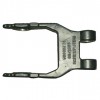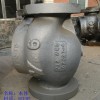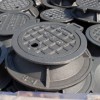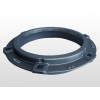Materials:
ASTM standard: H35, H85, H45, V-415-205, 415-205, 450-240, 485-250, 487-275, WCA, WCB, WCC, LCA, LCB, LCC, H85W, H60A, ICI8630, ICI4130, ICI4140, ICI4340, CF-8, CF-8M, etc.
Japanese standard: SC360, SC410, SC450, SC480, SCW410, SCW450, SCW480, SC450W, SCC5B, SCMn2B, SCSiMn1H, SCSiMn2H, SCSiMn3H, SCMn34H, SCMnMoH, SCS13, SCS13A, SCS14, SCS14A, etc.
French standard: GE230, GE280, GE320, GE370, G20Mn6, G25CrM04, Z6CN18.10M, Z6CND18.12M, etc.
Steel casting is a type of ferrous investment casting in which casts are made out of stainless and carbon alloy steels. During steel casting,
free-flowing liquid steel is shaped through the use of molds. Steel casting produces small, complex, or hard-to-machine shapes, eliminating the need for assembly, welding, and other finishing work.
Important factors to consider when selecting steel castings are the design, material and testing. When ordering steel castings, the type of
steel that will be used to produce the part must be identified. Steel castings are usually ordered to ASTM requirements. By specifying the
test methods for an order, the requirements of the material can be guaranteed.
Steel castings are utilized by multiple industries including energy, construction, transportation, general industry, and marine. Examples of
items that are steel castings include: hydroelectric turbine wheels, forging presses, gears, railroad car frames, valve bodies, pump casings,
mining machinery, marine equipment, and engine casings. Because steel are stronger than cast iron, wrought iron, and malleable iron,
steel castings are typically used in the manufacturing of parts that must endure shocks, wear, or heavy loads. Steel castings can be made
from carbon steel, low and high alloy steel, low temperature steel, heat resistant steel, and stainless steel.
















